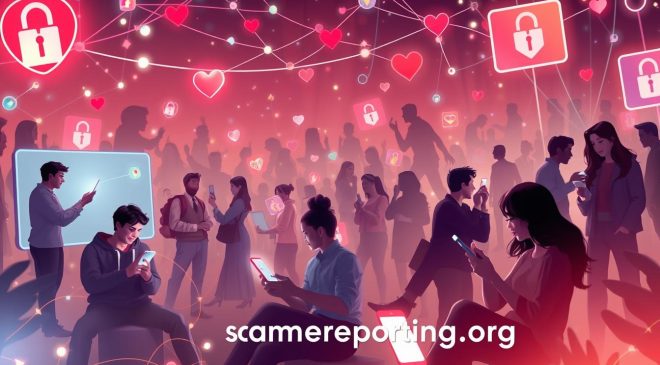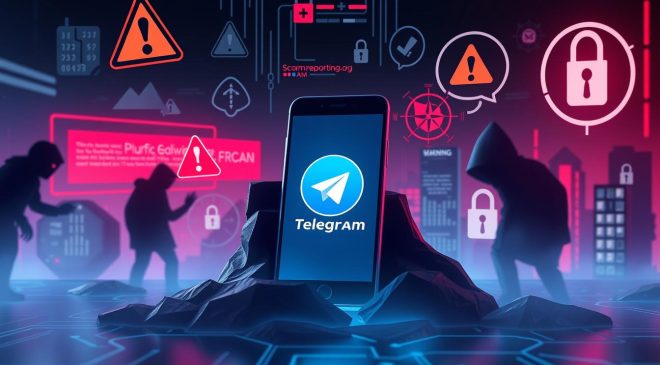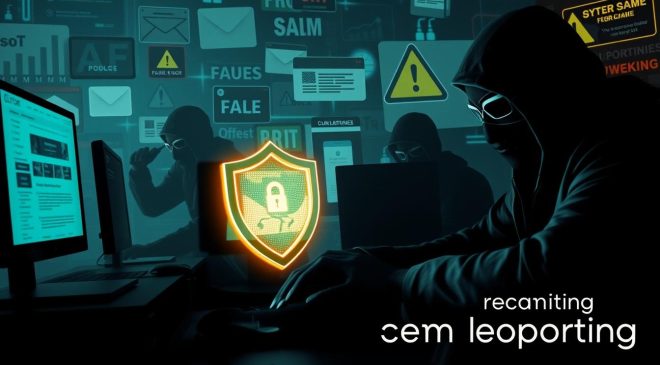
In 2023, romance scams took a huge toll on Americans, costing them $652 million. This shows how important it is to know about online fraud and cybersecurity. With digital scams getting smarter, it’s key to learn about Ivory Coast scams and how to protect your money.
Ivory Coast scams are a big part of the online fraud problem. They use feelings and trust to trick people, leaving them out of money and feeling bad. These scams affect people all over the world, like in Australia, where those over 65 lost nearly $33 million from 2021 to 2023.
Cybercriminals are always changing how they scam people. Social media has given scammers new ways to reach out, with many romance scams starting on sites like Instagram and Facebook. So, it’s important to be careful when talking to strangers online, especially if you’re sharing personal or money details.
Key Takeaways
- Romance scams cost Americans $652 million in 2023
- Australians over 65 lost $33 million to romance scams from 2021-2023
- 40% of romance scams start on social media platforms
- Ivory Coast scams are part of a broader trend of online fraud
- Awareness and vigilance are key to protecting against digital scams
Understanding the Threat of Ivory Coast Scams
Ivory Coast scams are a big worry in the world of cybercrime. They are a threat to digital security, especially for students and schools.
Definition and prevalence of Ivory Coast scams
Ivory Coast scams are fake tactics from or linked to the West African nation. They often target students looking for cheap textbooks or materials. Studies show 20% of students have fallen for digital textbook piracy, showing how common this problem is.
Common tactics used by scammers
Scammers use many tricks to trick people:
- Offering “free” textbooks
- Selling fake or stolen access codes
- Disguising malware as course materials
Why Ivory Coast is often associated with online fraud
The Ivory Coast is linked to online fraud for several reasons:
| Factor | Impact |
|---|---|
| Economic challenges | Pushes people to seek illegal ways to make money |
| Limited cybersecurity measures | Makes it easier for scammers to operate |
| Global internet connectivity | Reaches potential victims all over the world |
To avoid these scams, always be careful and use trusted sources for school materials. If an offer seems too good, it likely is.
The Rise of Digital Textbook Piracy
Digital textbook piracy is a big problem in schools today. Shockingly, 20% of students admit to downloading course materials illegally. This not only harms academic integrity but also puts students at risk of legal trouble.
Students who don’t get affordable access to books are more likely to turn to piracy. The high cost of textbooks pushes them to find cheaper ways. But, this quick fix can cause bigger problems later.
Copyright infringement is a big deal. Publishers and authors work hard to make educational materials. When students download these illegally, they hurt the whole academic system.
“Education should not come at the cost of ethics. We must find ways to make learning materials accessible without resorting to illegal methods.”
There’s also a big cybersecurity risk with digital piracy. Free textbook sites can have malware, putting students’ data at risk. As technology gets better, so do the ways people try to use it for illegal things.
Schools are fighting back against piracy. They’re making stricter rules and teaching students about piracy dangers. Some schools are working with publishers to offer cheaper digital books, hoping to lessen the need for illegal downloads.
Keeping learning honest in the digital world needs everyone’s help. Students, teachers, and publishers must work together for a fair and ethical learning space.
Risks Associated with Illegal Downloads
Illegal downloads are a big risk for students. They can lead to academic problems, legal issues, and privacy concerns. Let’s look at the dangers of downloading pirated textbooks.
Academic Consequences
Downloading textbooks without permission can hurt your grades. Pirated materials might be outdated or wrong. This can cause you to get lower grades and misunderstand your course material.
A survey showed 20% of students have downloaded pirated textbooks. Students who didn’t use school access programs were more likely to do this.
Legal Ramifications
Downloading files illegally is a crime. If caught, you could face serious consequences at school. This could mean getting suspended or even kicked out.
Some websites sell fake or stolen textbooks. This puts buyers at risk of getting something they shouldn’t have.
Data Privacy Concerns
Pirated downloads can have malware, which is bad for your computer and data. Over 100,000 pieces of malware were found in free textbooks. These viruses can damage your computer and put your data at risk.
The FBI has seen cases of students getting scammed through fake activities. This includes credit card scams targeting students.
| Risk Type | Percentage | Potential Consequence |
|---|---|---|
| Digital Textbook Piracy | 20% | Poor grades, outdated information |
| Malware in Pirated Downloads | 100,000+ cases | Data theft, network infiltration |
| Credit Card Scams | Not specified | Financial fraud, legal issues |
To stay safe, don’t share passwords or access codes. Don’t use school info on commercial sites. Be careful with personal info on public Wi-Fi. By being careful, you can avoid the dangers of illegal downloads and keep your academic future safe.
Targeted Scams Against College Students
College students are facing a growing threat from cybercriminals. These scammers use tactics that target young adults’ vulnerabilities. A recent study found that 41% of college students have had their identities stolen, which is much higher than the average.

Cybercriminals often pretend their malware is free textbooks or course materials. In fact, over 100,000 malicious files have been found targeting students. These attacks aim to steal student privacy and get sensitive data.
Students can lose a lot of money from these scams. On average, they lose $1,200. This can be a huge part of a student’s budget, causing long-term financial stress.
| Scam Type | Prevalence | Average Loss |
|---|---|---|
| Fake Textbook Sites | 35% | $250 |
| Phishing Emails | 28% | $400 |
| Scholarship Fraud | 22% | $1,000 |
| Job Scams | 15% | $2,000 |
Only 56% of scams against students are reported. This makes it hard for authorities to fight these crimes. Students need to be careful and know about the risks to avoid falling into these scams.
Identifying and Avoiding Online Textbook Cons
It’s important for students to stay safe online when buying textbooks. Scammers often target college students with fake deals. Knowing how to spot red flags can help you avoid these scams.
Red Flags for Fraudulent Textbook Websites
Watch out for prices that seem too low. Scam sites use huge discounts to lure students. Look for poor design, spelling mistakes, and no contact info. These are clues of a fake seller.
Verifying Seller Legitimacy
Do your homework on the seller before buying. Check reviews on trusted sites like the Better Business Bureau. Real sellers have addresses and phone numbers. Missing this info is a warning sign.
Safe Purchasing Practices
Use secure payment options and avoid sending cash or wiring money. Buy from well-known stores or your college bookstore. If using online marketplaces, pick sellers with lots of positive feedback. These steps keep you safe when buying textbooks online.
| Safe Practices | Why It Matters |
|---|---|
| Use secure payment | Protects financial information |
| Buy from known sellers | Reduces risk of scams |
| Check seller reviews | Verifies seller reliability |
| Avoid too-good deals | Prevents falling for fake offers |
By following these tips, you’ll get better at online safety and protecting yourself as a consumer. Being careful ensures a safe online shopping experience for textbooks and other course materials.
The Danger of Illegal or Stolen Access Codes
Digital course materials have brought new challenges to academic honesty. Scammers now use fake websites to sell illegal or stolen access codes. These codes are meant to unlock digital textbooks and educational resources but are often expired or don’t work.
Students looking for cheaper study materials might fall into these scams. This can lead to big problems, like losing money or facing school discipline.
“Purchasing access codes from unauthorized sources puts students at risk of both academic and financial fraud,” warns a cybersecurity expert from a leading university.
To keep safe from these scams:
- Always buy digital course materials from official sellers or directly from publishers
- Be careful of deals that seem too good to be true
- Make sure the website is legit before buying anything
- Don’t share your personal or financial info on shady sites
By being careful and valuing academic honesty, students can dodge the dangers of illegal access codes. This way, they can have a safe and successful learning journey.
Ivory Coast Scams: Protecting Your Digital Identity
In today’s digital world, keeping your online identity safe is key. Ivory Coast scams are on the rise, making it vital to follow good digital habits and stay safe online.
Safeguarding Personal Information Online
Keeping your personal data safe is crucial for online safety. Don’t share passwords or access codes, and don’t use school info on public sites. Also, be careful with public Wi-Fi, as it’s not safe for sharing sensitive info.
Best Practices for Password Management
Good password management is a must for staying safe online. Create unique, complex passwords for each account. Think about using a password manager to keep them all in one place safely.
| Password Do’s | Password Don’ts |
|---|---|
| Use a mix of characters | Use personal information |
| Make it long (12+ characters) | Reuse passwords |
| Use two-factor authentication | Share passwords with others |
Recognizing Phishing Attempts
Phishing scams are a big threat to staying safe online. Be careful with emails you weren’t expecting, suspicious links, and requests for your personal info. Always check who sent the email before giving out any info.
“The best defense against phishing is education and vigilance. Stay informed about current scam tactics and trust your instincts if something seems off.”
By following these tips, you can boost your online security and stay safe from Ivory Coast scams and other threats.
Reporting Fraudulent Activity and Seeking Help
Spotting fraud is important, but acting on it is key for consumer safety. If you’re scammed, report it fast. This stops others from getting scammed and helps fight cybercrime.
The Federal Trade Commission (FTC) is where you should go to report fraud. Their website makes it simple to file complaints about scams aimed at students. Also, don’t forget to contact local police and your school’s IT team for cybercrime reports.

For safer online shopping, use the Better Business Bureau’s ScamTracker. This tool helps you see if a company has had complaints or fraud issues before. It’s a smart way to protect yourself before buying anything.
| Reporting Channel | Type of Fraud | Response Time |
|---|---|---|
| FTC | Consumer Scams | 1-2 weeks |
| Local Police | Identity Theft | 24-48 hours |
| School IT Dept | Campus-related Fraud | 1-3 days |
Your quick action in reporting scams is crucial for fraud prevention. By staying informed and using these resources, you’re not just protecting yourself. You’re also helping create a safer digital world for everyone.
Conclusion
In today’s digital world, keeping students safe online is key. As scams and cyber threats grow, knowing how to stay safe is vital. Students need to learn about the risks and how to protect themselves.
Students must guard their personal info and watch out for phishing scams. They also need to be careful in their studies, avoiding illegal digital book sharing. By picking trusted sources and checking who they buy from, students keep their grades and money safe.
Keeping the internet safe is a team effort. Schools, tech companies, and police all have a part to play. But the most important thing is for students to be careful and informed. By being alert and following safety tips, students can safely explore the internet. They can focus on their studies without worrying about scams.
FAQ
What are Ivory Coast scams?
Ivory Coast scams are online frauds targeting students and others. They often use fake websites to sell “free” textbooks or stolen access codes. They may also hide malware as course materials.
How prevalent are Ivory Coast scams?
Ivory Coast scams are part of a big online fraud trend. Recently, a fake website stole personal data from 10 million users. This shows how big the threat is.
What are the risks of digital textbook piracy?
More students are illegally downloading textbooks, with 20% admitting it. This not only harms academic honesty but also brings legal and cybersecurity risks. Students might face malware and data theft.
What are the academic consequences of illegal downloads?
Illegal downloads can lead to serious academic problems. It’s a crime under the Higher Education Act. Students may use outdated or wrong materials, hurting their grades.
Are college students targeted by cybercriminals?
Yes, college students are often targeted by cybercriminals. Over 100,000 malware pieces, pretending to be free textbooks, have been found. These aim to steal student data and privacy.
How can I identify fraudulent textbook websites?
Watch out for prices that seem too low. Always check the website and seller’s credibility. Look for reviews and contact info. Some sites sell fake or stolen books, leading to legal trouble or financial loss.
What are the dangers of buying illegal or stolen access codes?
Scammers sell fake or stolen access codes for digital courses. Students might find the codes don’t work. Then, the scammers use the student’s credit card info for fraud.
How can I protect my digital identity from Ivory Coast scams?
Keep your digital info safe by not sharing passwords or access codes. Don’t use school info on commercial sites. Be careful with public Wi-Fi, avoiding personal info sharing. Watch out for fake Wi-Fi spots that steal your data.
How do I report fraudulent activity related to Ivory Coast scams?
Report fraud right away. Buy from trusted sources. Use the Better Business Bureau and their ScamTracker Risk Report to check retailers before buying.


